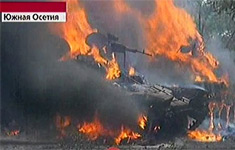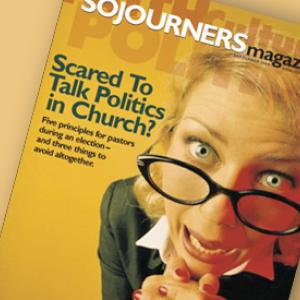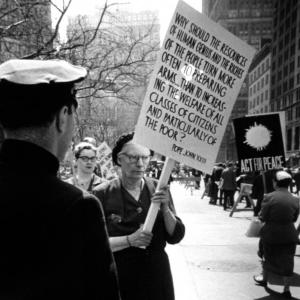Posts By This Author
The Fracture of Good Order
"The Catonsville Nine: A Story of Faith and Resistance in the Vietnam Era"
IT'S BEEN ALMOST 45 years since nine Catholic peace activists entered a draft board in Catonsville, Md., filled two wastebaskets with military draft files, and burned the papers in a parking lot. What made the headlines especially big was the involvement of two Catholic priests, Daniel and Philip Berrigan.
For many people, me among them, the Catonsville raid was a turning point in our lives. It also triggered passionate debate about the limits of peaceful protest. Could property destruction be called nonviolent?
The prime movers of the Catonsville Nine were Phil Berrigan and George Mische. Mische had worked for U.S.-funded groups fostering labor movements in the Caribbean and Latin America. Phil had fought as an infantryman in World War II, where his courage won him a battlefield commission. Dismayed that the peace movement was having no discernible impact on events in Vietnam, Berrigan became convinced of "the uselessness of legitimate dissent." He opted for firing the cannons of civil disobedience.
Many U.S. troops were draftees; few had a longing to go to war in a country that posed no threat to the U.S. and whose borders most Americans couldn't find on a globe. The key role conscription played in keeping the war going made draft-board files an obvious target. One of the nine, Tom Lewis, called the files "death certificates."
A Pro-Lifer Who Welcomes the Obama Presidency
The Church's Role in the Georgia-Russia Conflict
 The recent Georgia-Russia mini-war in and around South Ossetia was definitely not a religious war, but it serves as a reminder that religious identity doesn't even come in third place when issues of national identity are at issue. While the battle raged, the majority of participants -- and casualties -- were Christians on both sides.
The recent Georgia-Russia mini-war in and around South Ossetia was definitely not a religious war, but it serves as a reminder that religious identity doesn't even come in third place when issues of national identity are at issue. While the battle raged, the majority of participants -- and casualties -- were Christians on both sides.
In both countries, the Orthodox Church [...]
No Secrets
I wonder if there are not many Sojourners readers who were dismayed with Brian McLaren’s essay in the March 2006 issue (“Found in Translation”)?
'Saint' Dorothy
Book Review: Dorothy Day: Portaits by Those Who Knew Her (Orbis Books: 2003).
Opening Heart and Home
Dorothy Day taught us the real meaning of hospitality by the way she lived day to day.
Early in Dostoevsky's novel The Brothers Karamazov, a wealthy woman asks Staretz Zosima how she can really know that God exists. The elderly monk tells her that no explanation or argument can achieve this, only the practice of "active love."
The woman then confesses that sometimes she dreams about a life of loving service to others - she thinks perhaps she will become a Sister of Mercy, live in holy poverty, and serve the poor in the humblest way. But then it crosses her mind how ungrateful some of the people she would serve are likely to be. They would probably complain that the soup she served wasn't hot enough or that the bread wasn't fresh enough or the bed was too hard. She confesses that she couldn't bear such ingratitude - and so her dreams about serving others vanish, and once again she finds herself wondering if there really is a God. To this the Staretz responds, "Love in practice is a harsh and dreadful thing compared to love in dreams."
I often heard Dorothy Day recite those words. I doubt any chapter in any work of literature had so much importance for her. She had first read Dostoevsky's novel when she was in her teens. It was partly through Dostoevsky that she formed an understanding of Christianity that wasn't typically Western, seeing it not simply as an institutional structure but as a way of life in which nothing was more important than seeing Christ in others.
Of course there were many other influences. Her understanding of basic Christianity was partly shaped by the emphasis on hospitality in the Holy Rule of St. Benedict, with its requirement that "each guest must be received as if he were Christ." There was also the influence of St. Francis of Assisi, who gave an example of downward mobility rather than upward mobility, whose life was the opposite of a rags-to-riches chronicle. He was one of the sources of the stress she put on what she called "voluntary poverty."
A Living Example
Brazilian Catholic archbishop Helder Camara brought a "preferential option for the poor" to the center of Christian social thinking.
Not the Church of Ethnic Cleansing
A Community That Endures
An Inspired Complainer
Despite her insistence that things aren't the way they should be, Dorothy Day was intensely aware of beauty.
Despite her insistence that things aren't the way they should be, Dorothy Day was intensely aware of beauty.
The Most Interesting Place in the World
Bosnia's Unhealed Wounds
No matter what religious tradition one is part of, the grim cycle of violence and counterviolence that has gone on for more than three years in the former Yugoslavia indicts us all...


